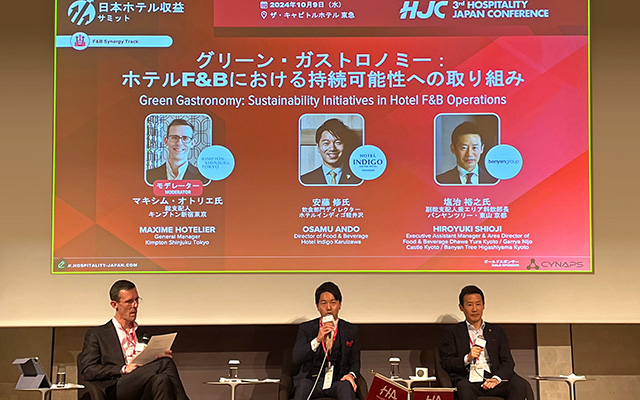Growing environmentalism among inbound travellers is driving Japan’s hotels to be more sustainable, although greater guest education is needed for real progress.
Panellists at the Hospitality Japan Conference, held in October, said demand for green practices was prompting them to rethink and improve, or face loss of business.

“Inbound tourists are against plastic and don’t want to see PET bottles of water on tables during events. In Japan, our recycling rate of PET bottles is so high that we have not been thinking in the same way,” said Hitoshi Fujisaki, general manager at The Tokyo Station Hotel.
“Before making a booking, overseas travel companies ask us if we have a sustainability strategy,” said Yoshinori Nishihara, senior advisor at Tokyu Resorts & Stays Co., adding that European and North American travellers are particularly interested in making responsible choices.
Seven in 10 European travellers told Accor in a 2024 study that sustainability is important to their decision-making when travelling.
“Sustainability is an expectation among inbound travellers,” agreed Katrina Uy, general manager at The Shinmonzen.
At Banyan Tree Higashiyama Kyoto, where 80 per cent of guests are from overseas, the management recognises the need for to do more.
“We note on our menu that some vegetables are from Hokkaido, but international guests want to know where in Hokkaido, and even who grew them (to understand our level of sustainability),” said Hiroyuki Shioji, the hotel’s area director of food and beverage.
At the same time, though, more education is required for guests to understand the limitations and inconveniences that can be caused by more sustainable practices, he explained.
“Most guests expect a buffet so it is hard to balance this expectation with sustainability,” noted Shioji, adding that buffets can result in high food loss and food waste.
“Until recently, it wouldn’t be acceptable for us to be sold out of anything on the menu, but when you pursue sustainability, it can happen. We are trying to change the mindset on sold out – that it shows responsible ordering to reduce food waste.”


















